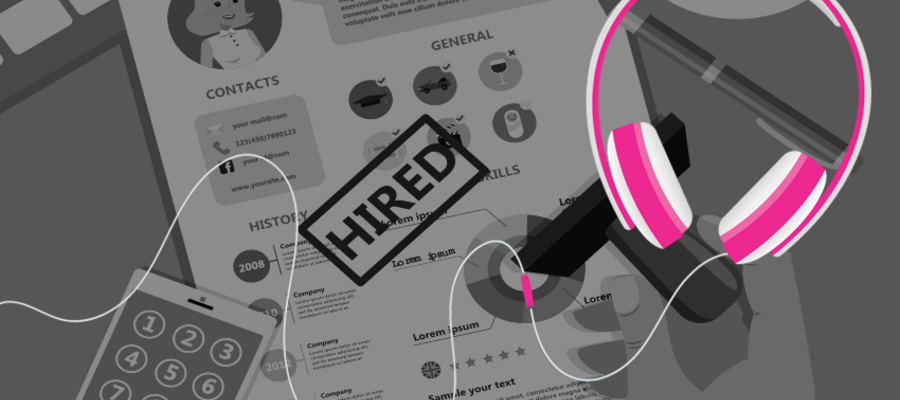become podcast
Applying for a new role can be a daunting process. Our podcasts are here to make the process as seamless as possible, by providing you with the information and tools you need to land your next dream role. Hosted by our experienced Australia, Hong Kong and UK teams, we aim to help you stand out and showcase your ability and experience.
Listen to our latest podcast - common mistakes that jobseekers make
This podcast is hosted by David Valks and Ashley Dodd from the become Sydney Office, Australia.
Finding out the common mistakes that candidates make during the job seeking process will help you to avoid doing the same and guide you into landing your dream job!
1. Using an unprofessional photo
Our advice is to take your photo off - some people just don’t like photos
If you do have one, you should get it right - personal Facebook, e.g. night out, as pretty as you might look, is not appropriate
It does reflect on you - inject personality but keep it in the parameters of professionalism
Clients do look up candidates on social media to check if they’re a good fit for them - look at it objectively, how does your profile present to clients?
Content is relevant to yourself and brand – LinkedIn, Facebook etc.
Must be in good taste
2. Not tailoring your application to the role that you’re applying for
Applying for the wrong type of roles
Provide too much detail of irrelevant experience, jobs that have completely no relevance for the one you are applying for
Adding jobs to your CV that were 10 years ago
It’s about drawing client’s attention to where you want it to be
3. Tailoring the cover letter to the relevance of what you’re applying for
Hiring managers will glance at CVs and cover letters
Provide key information at the top of the CV
Agencies will look for other agency competitors on your CV, where there are transferable skills
You can still include retail experience if it goes well with role eg. project management or account services
Make cover letter relevant to make application – really stand out
4. What makes your CV relevant?
Having a CV that’s too lengthy - keep your CV to 1-2 pages max, 3 pages is a real push
Make every word count - every word you write is a chance to sell yourself to the future employer
In terms of education, no need to state primary school, higher education and above is all you need
5. Sending out a generic cover letter
Addressing the wrong person, wrong company, really shows lack of care
Use this to explain succinctly your situation, e.g. moving interstates, your visa etc. include these key details or if your wishing to make a career move from Account Executive moving to design etc.
Writing these details in an email is fine too, can be in place of a cover letter
Make it good, if you do have a Cover Letter, make it count, make it stand out, don’t just say I’m good at team working!
6. Spelling and grammar
No excuses - especially in this day and age, you have access to Spell Check and Grammarly!
It only takes 5 minutes, it could mean the difference in landing your dream role or not
It’s really important e.g. if you’re in the advertising industry and if you can’t get it right on your CV, how can you be trusted on a thousand dollar advertising campaign
Get someone else to check it for you - take advantage of a second, fresh pair of eyes
7. Applying for too many roles
Some candidates send in 4-5 applications for varying roles and at different levels - this shows that the person doesn’t know what they’re after
Keep track on what you’re applying for and where you have sent your details to - keep that list on file for your personal record/reference
If you’re doing that to a recruiter, it’s likely you’ve also done this directly with companies - clients won’t take you seriously
At Become, we won’t send your details without your permission
Clients keep their own record of when you’ve applied already
What if you haven’t heard back? Do follow up, but keep it respectful, allow a few days for the client to get back to you
8. Not researching properly or showing authenticity
Leading up to the interview process, you should research the company you have applied for - clients may ask, so do basic research about the company to show your interest
Remind yourself, why have you even applied for this?
Show clients you’ve done the research by keeping up to date with the industry and talk about the amazing campaigns the client has done
Don’t lie about your experience - don’t do it, you will be caught out!
Authenticity is key - why would we trust you on our projects if you don’t tell the truth
Don’t embellish your positions, e.g. if you’re an Account Executive, don’t write that you’re an Account Manager - reference checks are done
Remember, clients will probably be asking you "why are you looking for another job?" - you’re looking for a reason, tell the truth
Why and what are you looking for? - articulate well on your thoughts
Trickiest question, but tell the truth e.g. my contract is coming to an end, how this position can get to where you want to career wise
Some are candidates are very diplomatic – tell the truth, but don’t say negative connotations eg. toxic work environment
9. Not being consistent
Recruiters do collaborate and share information within themselves about candidates
Always be consistent with the information you share in interviews, clients will question your authenticity if the information is inconsistent
For example, if you’re in your 2nd interview but you answered questions differently to interviews before - e.g. be consistent with your salary expectations, get your story really clear!
Your pitch needs to be consistent right from the beginning, don’t leave a bad taste in the client's mouth
10. Final point: misreading the situation
Treat every interview as your first
Represent yourself as your brand
Be mindful of the tone you’re presenting yourself
Dress accordingly: if you’re a Designer a little bit more casual is okay, but if you’re an Account Manager board shorts and thongs are a big no-no - be mindful of what you’re wearing!
Always present yourself in the best light
Leave an excellent first and lasting impression: nicely presented and nicely dressed is a must
Check back to www.becomerecruitment.com/podcast to keep up to date with all the latest news and podcasts.

